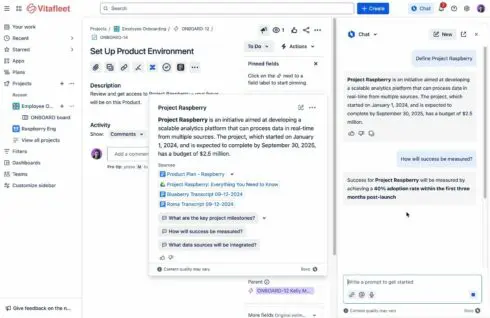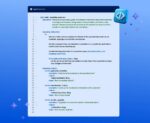
Over the last year, Atlassian has been introducing a number of AI enhancements across its products to help users be even more productive, such as generative AI in Confluence and Jira, suggestions on how to break down large projects, and AI generated automation rules.
Additionally, earlier this year, the company announced Atlassian Rovo, a generative AI tool for more easily accessing enterprise knowledge. Now, Rovo is officially generally available.
Atlassian Rovo enables companies to search across all of their enterprise data and apps, including third-party ones.
Users can then gain deeper insights from that data by using the chat functionality or browsing the automatically generated knowledge cards that provide a snapshot of specific information about projects, goals, new teammates, and more. Rovo Chat also is offered as a browser extension to give more specific help when working within a certain webpage, like asking questions about a specific Google Doc.
And finally, Rovo Agents are like specialized “teammates you can pull into your workflow” to assist with various tasks, like generating marketing content, integrating UX research into Jira specs, or cleaning up Jira backlogs. Customers can create their own agents using a no-code interface, or make use of Atlassian’s 20 out-of-the-box agents.
There is also a GitHub Copilot extension for Rovo, which can provide context about goals, teams, projects, design specifications, recent deployments, and more, all within GitHub Copilot.
According to Atlassian, beta customers using Rovo saw an average of 1-2 hours saved per week.
In addition to Rovo, Atlassian also just announced AI Agents, which for now are in early access. AI Agents are designed to reduce friction in development workflows by helping with non-coding tasks. They can generate code plans, code recommendations, and pull requests based on descriptions, requirements, and business context, for example.
“Today, AI assists in code completion, but isn’t addressing the majority of tasks that get in the way of development velocity and quality, like getting started on a task with unfamiliar requirements, searching for information, or waiting for pull requests to be reviewed. We’re looking to change all that with our new dev-focused AI Agents,” Atlassian wrote in a blog post.
The company also announced a number of AI improvements across its other products, like in Jira Service Management, which now leverages AI to group related alerts, suggest resources and SMEs, summarize details of issues, capture key timeline events during an incident, and generate post-incident reviews.
Additionally, the Jira Service Management virtual service agent, which was previously only available in Slack, is now integrated in the help center, Microsoft Teams, and email. There is also now an embeddable widget for external customer support.
And finally, after acquiring the video messaging tool Loom last year, Atlassian has further integrated it into Jira and Confluence. Customers can now generate documents in over 50 languages, create bug reports from Loom videos, and fill in Jira issues from a screenshot from a Loom video.






